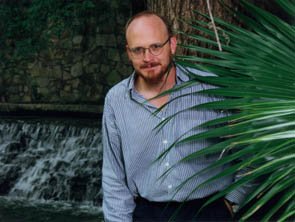
|
H
O W A R D
V. H
E N D R I X : Secular Mystic (excerpted from Locus Magazine, June 1999) | ||
 Photo by Beth Gwinn |
Howard V[incent] Hendrix was born March 5, 1959, in Cincinnati OH, educated mainly at Catholic parochial schools, and did undergraduate work in biology at Cincinnati Jesuit school Xavier University. In 1980 he moved to California for graduate study in English literature at UC Riverside, where he received his M.A., then his doctorate in 1987. After several years teaching at Central Methodist College, Fayette, Missouri, he returned to California and found a position as head of the School of Arts & Sciences for the Fresno campus of National University, a small California chain. |
|
|
''When I was nine, I read Raiders From the Rings by Alan E. Nourse. That just locked into my head, that little slot called 'sense of wonder,' and I was an unredeemable science fiction fan. My 'golden age' was 13, 14. I remember particularly a big Arthur C. Clarke omnibus Across the Sea of Stars. I've been heavily influenced by Clarke, especially the way in which he pushes science until it becomes mystical. The physicist Wolfgang Pauli said, 'Physics and mysticism are complementary aspects in a single reality.' I like that. ''I read all the greats – Asimov, Bradbury, Clarke, Heinlein. Really loved Bester and Sturgeon. The Stars My Destination just blew my head right off! I've kept up, and I'm still an active reader in the field. ''Of the novels, Lightpaths is much more a biological and sociological novel, whereas Standing Wave is more of a novel of physics, philosophy, and apocalypse. The third novel, Better Angels, has an odd relationship to the others. ''The background for the first novel came from my long-term interest in utopian and apocalyptic ideas. I gave a keynote speech at the Eaton Conference this year, and as I said there, the left hand of apocalypse is the right hand of utopia. There are very similar pushes, because both are initially viewed as end-points to history. Utopias are often seen as a static non-changing future, while apocalypses are the abrupt end. In my utopia, it is not something that ends – it changes, shifts, a constant goal that's never really achieved. ''I was trying to deal with how imperfect humans can make a more perfect society. So I set it aboard an orbital habitat which, of course, is threatened, because isolated places are always threatened. And I tried to work out a number of social, political, and biological issues. The initial impetus to write the book was the Turner Tomorrow Award. At that time, Turner was saying, 'Write a positive vision of the future.' I submitted a much earlier version, and consulting judge David Hartwell later told me it did quite well. ''I'm a secular mystic. It's obviously an oxymoronic phrase. I've been through a lot of different organized religions, and I have some personal trouble with them. Organized religions haven't worked for me, yet I still have this yearning, this impulsion to recognize the ways in which the universe is greater than I am. What is reflected in me, and vice versa. You look at the Kabbalah, at Christian mystical writing: 'As above, so below.' Or, as I phrase it in my second novel, 'As above, so below – and closer than they appear.' That's where I'm coming from. When epiphanies happen in these novels, when something breaks through from the other side, usually it's a way of showing that all our little concerns are not the whole picture, that there is something much larger. It's hard for us to get at it, to reach it, to touch it, but it's there. ''Lightpaths is about a group of three characters who are new to the orbital habitat, and we get to see the habitat through their eyes. Classic entry. In dealing with a utopia, the danger is that everybody's going to be a good guy. I have a villain, Roger Courtland. I didn't think he was going to be a villain, but he turned into one. I like my villains a lot. But nobody I know wakes up in the morning and says, 'Aha, what villainy can I do today?' He feels that he is working for his own best intentions, and the best intentions of everyone around him. His visions of what are the best of intentions differ fairly radically from everybody else's. And that's part of where the drama and the conflict in the novel come into being. ''I wrote Lightpaths in 1990. Then, when I came to write a second book, I went back and reread it, and there were a number of questions that weren't answered, which I tried to answer in Standing Wave. It's not about a utopia, although a little bit of it does take place on the orbital habitat. I tend to think of it as a philosophical, apocalyptic thriller. At the end of Lightpaths, one character achieves transcendence. At the end of Standing Wave, I do that for the whole universe. ''That brings up another issue. The book that was published first now turns out to be the second in the overall story arc, and the one published second turns out to be the last. The new book, Better Angels, will be the last published but the first in the story arc. So that's how it's a snake that eats its own tail, which is an image that comes up in Standing Wave.'' |
| © 1999 by Locus Publications. All rights reserved. |

